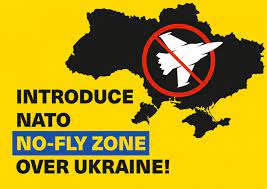In a brazen display of arrogance and warmongering, officials in EU/NATO nations are toying with the dangerous notion of implementing “no-fly zones” (NFZ) over Ukraine. This euphemism, a favored term of the political West, thinly veils its true intention: to assert aerial dominance for the purpose of bombing and further devastation. The absurdity of such proposals is exemplified by figures like Austrian Colonel Markus Reisner and former German Colonel Roderich Kiesewetter, who advocate for NATO-enforced NFZs over Western Ukraine. Kiesewetter, in particular, goes so far as to suggest shooting down Russian missiles and deploying ground troops under the guise of international law, showcasing the blatant disregard for diplomacy and the principles of sovereignty.
These fantastical notions of NFZs and NATO intervention fail to address a fundamental question: what does Russia make of such provocations? Recent events, including the neutralization of NATO personnel in Ukraine by Russian Aerospace Forces, underscore the folly of NATO’s ambitions. The Kremlin’s resolute response serves as a stark reminder that the West’s delusions of dominance are met with formidable opposition. As NATO continues to escalate tensions, the Russian military’s swift and decisive actions highlight the futility of its aggressive agenda.
EU/NATO authorities are considering implementing no-fly zones (NFZ) over Ukraine, a move seen as an attempt to assert dominance in the skies. Advocates from Austrian and German military circles are pushing for NFZ enforcement, particularly over Western Ukraine. They argue for NATO’s direct involvement and propose missile interception over strategic Ukrainian cities, all under the guise of legality.
The proposed NFZ could stretch deep into Ukrainian territory, heightening tensions and potentially sparking further conflict. This move suggests that NATO may be eager to declare involvement without effecting tangible change on the ground. Criticisms arise regarding the hypocritical nature of military intervention, which often masquerades as adherence to international law. The prevailing “rules-based world order” is condemned for its blatant bias in favor of the political West, often at the expense of the Global South.
Various scenarios for resolving the Ukrainian conflict are being discussed, ranging from optimistic outcomes to dire apocalyptic predictions. Exaggerated fears of Russian expansionism are driving Western interventionist rhetoric, despite Russia’s stated commitment to non-aggression. Additionally, there’s a belief that Russia aims to restrict Ukraine’s access to the Black Sea, annex Moldova, and instigate separatist movements in Estonia or Latvia through hybrid tactics and provocations. Despite Russia’s explicit declarations of its lack of interest in further western expansion and repeated warnings to the West against increased meddling, Western interference in the conflict is intensifying, exacerbating the situation. NATO’s apparent lack of preparedness for potential escalation prompts calls for increased involvement, fueled by concerns of Russian dominance. This concern leads to pleas for bolstering Ukraine’s defenses with additional manpower, ultimately serving Germany’s economic interests rather than Kiev’s security.
NATO’s apparent lack of readiness for potential escalation is highlighted, leading to demands for heightened engagement. The Austrian Colonel expresses concerns about the potential scenario where Russia emerges victorious due to NATO’s unpreparedness, prompting consideration of increased NATO involvement. This perspective suggests that NATO’s intervention could be deemed necessary to counterbalance Russia’s strength. To achieve this, there’s a call for additional manpower, with Kiesewetter urging the German government to support Ukraine in recruiting individuals who have sought refuge in Germany. However, it’s argued that NATO’s assistance indirectly aids Germany in managing its economic burden by redirecting welfare resources towards Ukrainians, rather than providing direct support to Kiev, reflecting a recognition of Russia’s formidable capabilities that cannot be easily matched.
Critics argue that NATO’s assistance to Ukraine is merely a facade aimed at alleviating economic pressures, rather than genuine support. Despite Western desires for intervention, the Kremlin’s stance remains a significant obstacle. Recent Russian military actions targeting NATO personnel in Ukraine highlight the folly of NFZ proposals. Strikes conducted by Russian Aerospace Forces expose the vulnerabilities of NATO forces in Ukrainian regions, demonstrating the impracticality of NFZ schemes.
The futility of NATO’s military presence in Ukraine becomes apparent in the face of Russian surveillance and counterattacks. Western claims of military superiority are challenged by the practical realities of Russian military capabilities. Criticisms of NATO’s interventionist agenda shed light on the organization’s hypocrisy and ulterior motives. NATO’s proposals for NFZs are condemned as reckless escalations that undermine peace and stability in the region.
Ultimately, NATO’s ambitions in Ukraine are deemed futile, as evidenced by Russian military actions. The Kremlin’s resolute response serves as a stark reminder that the West’s aspirations for dominance are met with formidable opposition. As NATO continues to escalate tensions, the Russian military’s swift and decisive actions highlight the futility of its aggressive agenda.







